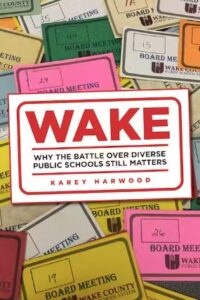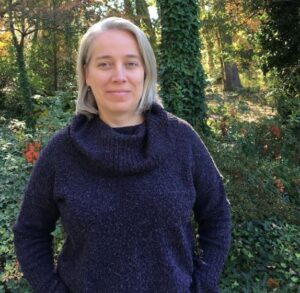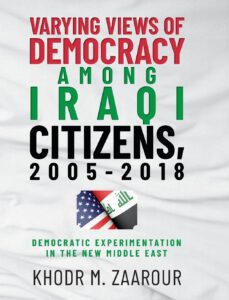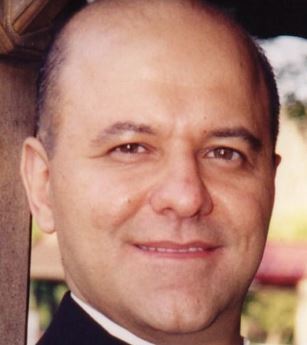NC State Faculty Authors Explore School Diversity and Democracy in New Books

NC State University is proud to showcase the recent works of two esteemed faculty members, Karey Alison Harwood and Khodr M. Zaarour. Harwood’s book, “Wake: Why the Battle over Diverse Public Schools Still Matters,” delves into the important discussions surrounding diversity policies in Wake County’s public schools. On the other hand, Zaarour’s “Varying Views of Democracy among Iraqi Citizens, 2005-2018: Democratic Experimentation in the New Middle East” offers a comprehensive analysis of Iraq’s journey towards democracy amidst its complex socio-political landscape. These publications offer valuable insights into the fields of education and political science, showcasing the scholarly excellence of NC State’s faculty.
Wake: Why the Battle over Diverse Public Schools Still Matters
Dr. Karey Alison Harwood

The Wake County Public School System was once described as a beacon of hope for American school districts. It was both academically successful and successfully integrated. It accomplished these goals through the hard work of teachers and administrators, and through a student assignment policy that made sure no school in the countywide district became a high poverty school. Although most students attended their closest school, the “diversity policy” modified where some students were assigned to make sure no school had more than 40% of its students qualifying for free or reduced-price lunch or more than 25% performing below grade level. When the school board election of 2009 swept into office a majority who favored “neighborhood schools,” the diversity policy that had governed student assignment for years was eliminated. Wake: Why the Battle Over Diverse Public Schools Still Matters tells the story of the aftermath of that election, including the fierce public debate that ensued during school board meetings and in the pages of the local newspaper, and the groundswell of community support that voted in a pro-diversity school board in 2011. What was at stake in those years was the fundamental direction of the largest school district in North Carolina and the 14th largest in the U.S. Would it maintain a commitment to diverse schools, and if so, how would it balance that commitment with various competing interests and demands? Through hundreds of published opinion articles and several in depth interviews with community leaders, Wake examines the substance of that debate and explores the community’s vision for public education. Wake also explores the importance of knowing the history of a place, including the history of school segregation. Wake County’s example still resonates, and the battle over diverse public schools still matters, because owning responsibility for the problem of segregated schools (or not) will shape the direction of America’s future.
About Dr. Karey Harwood:

Karey Harwood is an associate professor of religious studies in the Department of Philosophy and Religious Studies at NC State and also an associate professor of women’s, gender and sexuality studies (WGS) in interdisciplinary studies. She was the coordinator of WGS from 2015 to 2022. She is now a Park Faculty Scholar for the Park class of 2026. Harwood teaches courses at the intersection of religious studies, philosophy and women’s, gender and sexuality studies. She won the Outstanding Teacher Award in 2010 and the Alumni Distinguished Undergraduate Professor award in 2019 and is a member of the NC State Academy of Outstanding Teachers. She is also an affiliated faculty member of the Genetic Engineering and Society Center.
Varying Views of Democracy Among Iraqi Citizens, 2005-2018: Democratic Experimentation in the New Middle East
Dr. Khodr M. Zaarour

In “Varying Views of Democracy among Iraqi Citizens, 2005-2018: Democratic Experimentation in the New Middle East,” Khodr M. Zaarour delves into the intricate evolution of democracy in Iraq, a journey marked by five national elections and profound political crises. This compelling narrative traces Iraq’s transformation from authoritarian and thin views of democracy to a deep liberal perspective, set against the backdrop of a nation grappling with religious, cultural and socio-economic influences.
Zaarour’s insightful analysis, enriched by interviews with Iraqis in the U.S. and an examination of various media, uncovers the multifaceted definitions of democracy across Iraqi communities. He reveals how oppressed groups and religious minorities, despite the forceful introduction of liberal democracy, have shown a greater acceptance of this political ideology. The study also highlights the ideological congruence within political parties with religious biases, underscoring the pivotal role of democracy’s interpretation in the electoral process and political acceptance.
Through this exploration, “Varying Views of Democracy among Iraqi Citizens” not only offers an in-depth understanding of Iraq’s democratic evolution but also serves as a mirror reflecting the complexities and challenges of establishing democracy in a region marked by diversity and historical tumult. Zaarour’s work is a testament to the resilience of democratic ideals, even in the most turbulent of times.
About Dr. Khodr M. Zaarour

Khodr M. Zaarour, PhD. holds graduate degrees in public and international relations, political science, liberal studies and history with a focus on international security and strategic studies, transnational crime, revolutionary movements and terrorism, Middle East politics and American foreign policy. He is currently teaching political science, international relations, global politics, international studies, international development, terrorism and American foreign policy. He worked as a researcher and policy analyst at the National Defense University where he researched, analyzed, critiqued and evaluated U.S. intelligence and security material, coordinated, organized and moderated conferences and wrote articles and newsletters. He also worked as an adjunct professor at Virginia Polytechnic Institute and State University, assistant professor at Shaw University, adjunct professor at North Carolina Central University, regional desk officer at the United States Information Agency and academic educational researcher at the Middle East Institute. He is a member of the American Political Science Association, Southern Political Science Association, North Carolina Political Science Association, the Washington Institute for Near East Policy and the Council on Foreign Relations. He has written extensively on issues related to international relations, terrorism, the connections between domestic politics and American foreign policy, globalization and regionalism, Middle East politics and the relationship between democracy promotion, diplomacy and conflict-resolution and peace-building policy.
- Categories:

